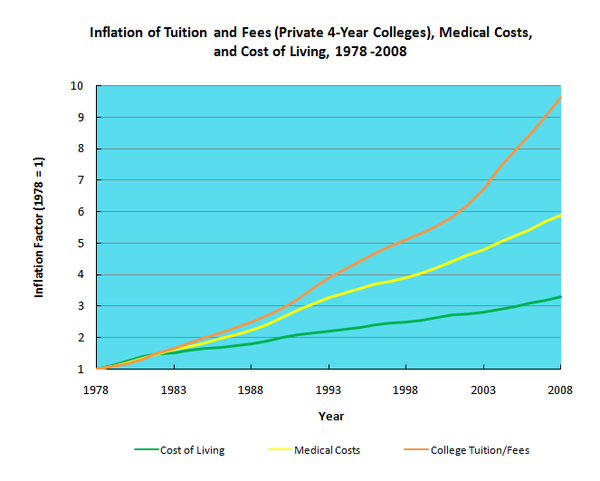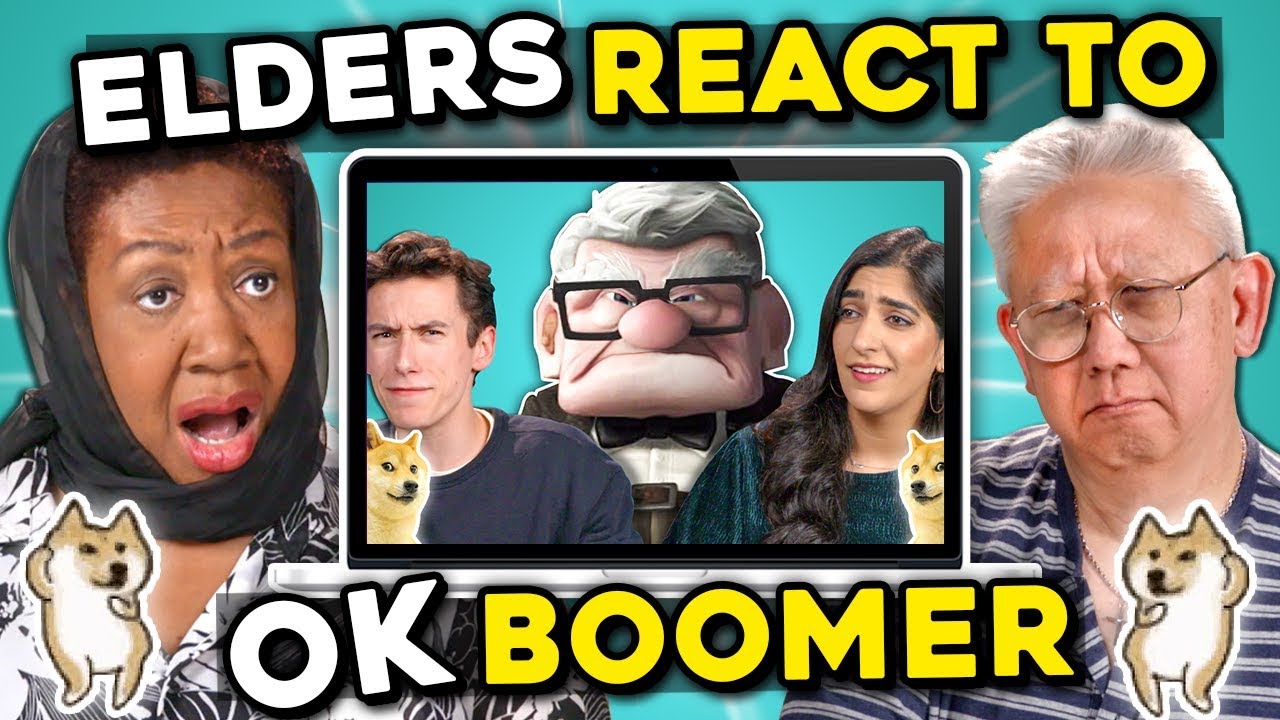Ok Boomer: It’s Deeper Than a Meme
Some people think of the Ok boomer meme as a funny little joke created by “millenials”. I think it’s actually a very subtle but clever reflection of a very important conversation we need to have about what’s happening in society right now.

Context for if you don’t know what Ok Boomer is: “Ok Boomer” is a tongue-in-cheek/sarcastic response for when baby boomers complain about or make unhelpful comments to millenials. For example:
Boomer: When I was your age, I worked in the summers to pay for my tuition. Just get a summer job.
Millenial: Ok Boomer
Context: University costs have increased 10.5X in the last 30 years. While inflation has only risen 3.25X and healthcare costs have risen 6x (source). So while that may have been useful advice when the baby boomers were in university. It is not very helpful in the face of significantly higher tuition costs.

the tl:dr; of this thread is:
– younger and older generations view the world drastically differently
– as technology and society change at an accelerating rate, the difference increases
– this change has always existed, history is just repeating itself
– internet exposes what was already there
– We should probably talk and empathize more with people who have different views
– (preferably in real life, online works too)
(I originally wrote this as a thread on Twitter, so the paragraphs are short to represent tweets.)
Society is Changing
Society has changed a lot in 20 years. If you are young, you don’t even notice this “change” because it’s all you’ve ever known.
If you are older, you remember a world without Amazon and Google. Facebook wasn’t even around 15 years ago. Things that were illegal or taboo are now legal or normalized.
This means that you have a dual structure in our society: Those who have always grown up in this society and those who witnessed it change before their eyes.
This isn’t new. Open a page from NYtimes in 1950’s and adults will complain about “kids these days” with their Elvis music and his inappropriate pelvis shaking. People complained that the radio would ruin society.
I once wrote about how people complained that the invention of “books” (printing press) would be the downfall of society: https://blog.tomiwa.ca/the-organized-mind-summary-notes-and-review/

The difference is the rise of the internet. Younger people now have platforms to reach more people and they have a voice. Social media puts people with drastically different worldviews “in the same room”.
We have always spent most of our time with people who generally have the same worldviews as us. In the rare situations where we were in social situations with people of opposing worldviews (thanksgiving dinner with extended family or office christmas party) the social rule was “don’t talk about religion or politics or anything controversial.” So everyone just politely talks about the chicken or the weather and keeps it moving.
Now with the internet, we are forced to confront that there are people you know who hold differing views.
Socially, If you are over 50: Most of the social norms that were “bad” when you were in your 20s, are now “normalized”. Things that were normalized, are now taboo.
Change is hard for everyone and most people’s worldviews were formed in 20s and 30s and don’t change, even if society changes.
Technology is Changing
One thing I personally take for granted is the drastic differences in how people view technology.
For people like me, my smartphone and laptop is a part of me. I spend more time on “the internet” than “the real world”. Everytime I have a problem or question my first thought is to “Google it”.
It’s very interesting to see how other people absolutely dread using computers.
They don’t use technology because “they want to” they use it because it because they “have to”: “that’s the only way I can see the photos from my daughter’s vacation”
An actual conversation that happened to me at the barbershop:
him: “you’re an engineer right, can you help me figure this out?”
him: *goes away for 5 minutes*
him: Can you help me log in to my Instagram?
me: *clicks ‘Login With Facebook’*
him: Woah, can you show me how you did that?
Young and Old People Financially Need Each Other
I think this is especially important because of the financial implications:
Developed countries are getting older, pensions are underfunded, they will rely on younger populations to support aging workforce. Younger populations feel like older generation have not given them equal opportunities and have a worse outcome than the older generation had at the same age. How will this get resolved?
Let’s talk about money:
We have two conflicting needs.
Young people have a lot of student loans, rent and employment needs.
Old people have pension and health care needs.
Both needs are important, how do we decide how to split the pie?
Exhibit 1:
Fascinating story in @cbc about student loans. But the comments are the interesting part:
https://www.cbc.ca/news/canada/ottawa/university-student-debt-photo-essay-1.4305589
Exhibit 2:
Most countries cannot afford to pay their social welfare obligations to the elderly,
I have talked about it here:https://blog.tomiwa.ca/hedged-optimism-why-i-invested-botswana/
Both groups of people have very important needs, neither of which we can currently afford.
If we aim to solve this, we need to get better at empathizing with others. We literally need the young and old to work together to solve this problem.
Adjusting to Diversity
I live in Toronto, one of the most diverse countries in the world. This is one of the reasons I love Canada.
But I am a first generation immigrant and most of my friends are first generation immigrants. Which creates an interesting dynamic:
Before coming to Canada, most immigrants grew up in mono-cultural societies, where everyone was the same (relative to Canada).
Now with globalization, there is more diversity in their office than in the entire country they came from.
This is actually a great thing because when you interact with people from different religions, races, cultures, you realize that you all enjoy watching NBA or EPL, enjoy the same Netflix shows, eating at Tim Horton’s etc.
You realize that fighting and hating people over arbitrary differences is just tribalistic nonsense we inherited from our ancestors.
Like Shakespeare says in Merchant of Venice “Basically, we’re all the same. So where is the love?”
Source: https://www.sparknotes.com/shakespeare/merchant/quotes/
If you are born or were introduced to diversity early, it’s easier for you to learn this.
Unfortunately, if you grew up in an environment without diversity, this is not the case and it’s hard to unlearn your social conditioning.
The most you can do is just have empathy for such people and try to stop the spread of toxic beliefs.
As funny as it sounds, we don’t always choose our own thoughts and beliefs.
It gets put into our head subconsciously.
I’m speaking from experience here. Sometimes I think about things I don’t want to think about or I do things which I know are wrong. “Who put that in my head?”
We can either choose to leave it there or actively try to change it.
Memes do a fantastic job of taking important topics that are too sensitive or complex for society to collectively talk about and use humor to say:
“Hey, this is an important thing, we should probably talk about this.”
Possible Solutions
The best solution I can think of is that people just need to talk more with people that are significantly older or younger than them. Actually, anyone who is sufficiently “different” from you is a good start.
Reading Malcolm Gladwell’s book Talking to Strangers is another good start. Full disclosure: I haven’t read it yet but based on the title alone, it’s the sort of book we all need to read.

Alternatively, consume content (Youtube, articles, tweets, Instagram accounts) targeted at a demographic significantly older or younger (or just different) from your demographic.
The key is that you have to leave your judgement at the door before you interact with people that are “different”.
Before you try to decide if what they are doing is “right” or “wrong”, “good” or “bad”. First, just try to understand “why”.
“Before you judge me, try hard to love me.”
